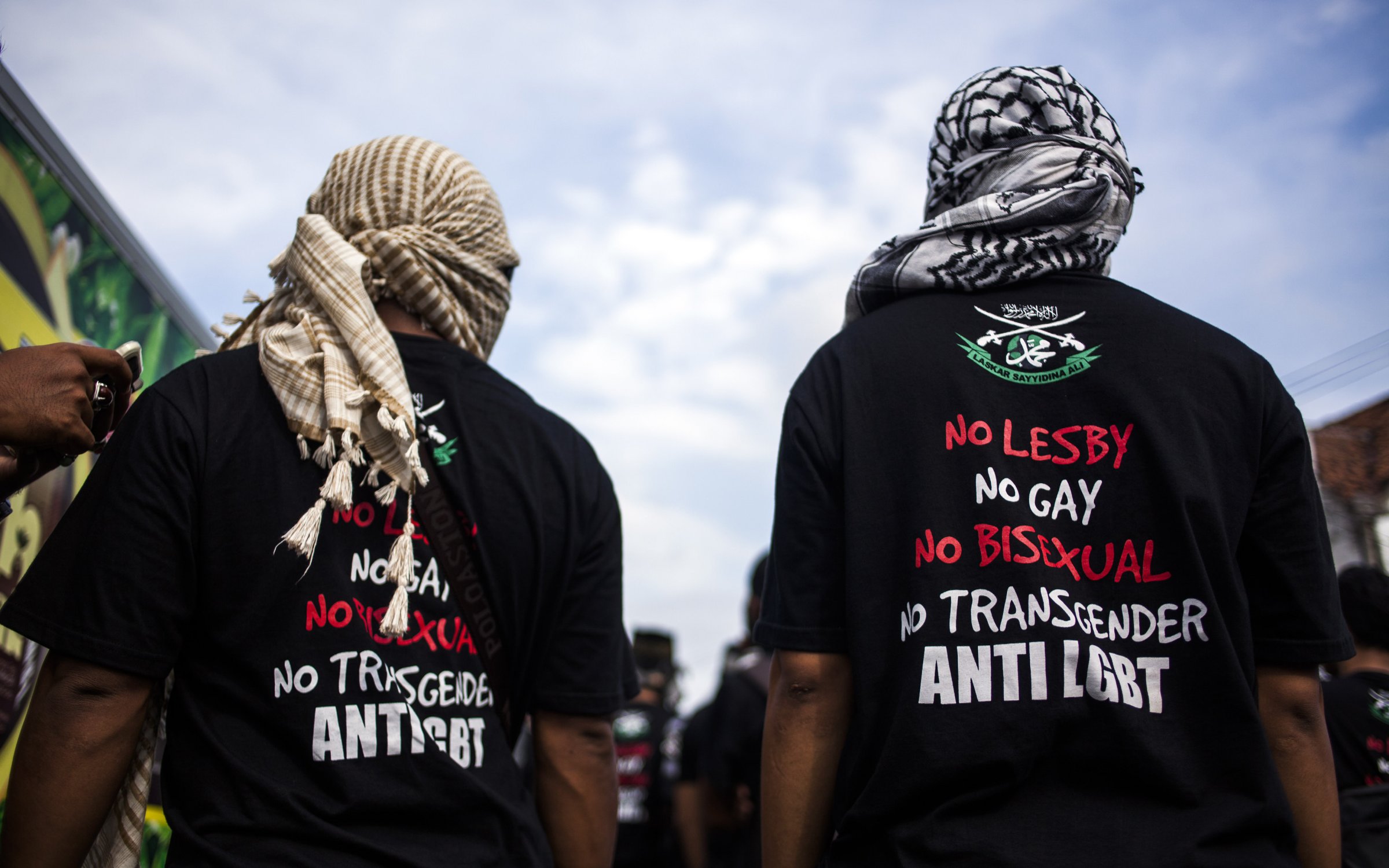
Agustine and her activist colleagues at Indonesia’s Ardhanari Foundation, which campaigns for LGBT rights, have become very cautious recently. They used to go in and out their office in Jakarta without attracting much attention from their neighbors. “But now people are paying attention,” Agustine tells TIME. “Sometimes asking why some of our staff members [look like] tomboys.”
But it isn’t just the stares and pointed questions that are making LGBT activists, sexual and gender minorities nervous in Indonesia. For months, there has been a swelling tide of anti-LGBT sentiment in the country, which has the world’s biggest Muslim population and prides itself for its tolerant brand of Islam.
On Thursday, Human Rights Watch published a 56-page report, ‘These Political Games Ruin Our Lives’: Indonesia’s LGBT Community Under Threat, documenting the alarming rise in anti-LGBT rhetoric in the country.
“The rights of Indonesian sexual and gender minorities have come under unprecedented attack in 2016,” the report says. “Across the country prior to January 2016, many Indonesian sexual and gender minorities lived with a mix of tolerance and prejudice … But in early 2016, [a] combination of government officials, militant Islamists, and mass religious groups stoking anti-LGBT intolerance led to immediate deterioration of the human rights of LGBT individuals. What began as public condemnation quickly grew into calls for criminalization and ‘cures,’ laying bare the depth and breadth of officials’ individual prejudices.”
Read more: Indonesia Is Asking Facebook and WhatsApp to Block Gay Emojis
It all started on Jan. 24, when Republika, a conservative-Islamic-leaning newspaper, splashed a headline “LGBT a Serious Threat” on its front page. On the same day, Higher Education Minister Muhammad Natsir denounced a little-known group that gives counseling and information about gender and sexuality to students at the University of Indonesia for not being “in accordance with the values and morals of Indonesia.”
In the following weeks, other politicians and government officials followed the suit, making homophobic statements and opening a floodgate of hostility towards the LGBT community: from objections over gay emojis to the country’s association of psychiatrists labelling being gay, bisexual and transgender as mental disorders. Then, Defend the Nation, a paramilitary training program that claims some 1.8 million participants, declared homosexuality as one of the nation’s enemies, along with communism and illegal drugs.
A transgender Islamic boarding school in the city of Yogyakarta, which had been featured in international publications, including TIME and the New York Times, was forced to close down in February, following intimidation from hard-line Muslims.
Religious hard-liners also paid a visit to Agustine’s Ardhanari Foundation. “They told us to stop campaigning for LGBT rights — that made us afraid,” she says. “We can’t work openly now.”
Read more: Islamist Intolerance Poses a Growing Threat to Indonesia’s Minorities
In early August, the Indonesian Survey Institute and the Wahid Foundation released a poll that showed LGBT people were the most disliked by Muslims in the country, followed by communists (the nation’s longtime bogey man) and Jews. “It’s strange because usually it is the communists and the Jewish people who claim the top two spots as the most disliked groups by Muslims,” researcher Aryo Ardi Nugroho of the moderate Islamic think-tank Wahid Foundation told the Jakarta Post.
The latest attacks include parliamentary and judicial efforts to persecute sexual and gender minorities. Indonesian lawmakers are pushing an anti-LGBT draft law, saying it is necessary to protect society from what they term “LGBT propaganda.” An Islamic pro-family group called the Family Love Alliance has submitted a judicial review to the Constitutional Court, asking the justices to revise the penal code and criminalize gay sex. (Unlike its neighboring countries like Malaysia, Singapore and Hong Kong — all three of them former British colonies — Indonesia has never had law that penalizes homosexual acts. The exception is Aceh, which implements Shari‘a.)
“The campaign of hate is apparently not over yet,” said Kyle Knight, LGBT-rights researcher at Human Rights Watch and author of the report, in a statement to media.
Lies Marcoes, an anthropologist and Muslim feminist, says sexual minorities and homosexual acts have long existed throughout the archipelago. “The problem, I believe, is not cultural, but how LGBT has become a political commodity to discriminate,” she tells TIME, adding that “since the reform [era], the public space has become more conservative.”
Read more: Inside Indonesia’s Islamic Boarding School for Transgender People
In mid-December, just weeks before the onslaught of anti-LGBT attacks began, Indonesian President Joko Widodo invited a group of comedians for dinner at the presidential palace. One of the stars that evening was Dorce Gamalama, a transgender woman whose jokes never failed to make Jokowi, as the President is widely known, burst into laughter. Yet, Jokowi himself has been silent about the LGBT controversy in the country.
“At a time when LGBT Indonesians needed protection and public support, Jokowi’s government has cowered in the face of militant Islamists,” Knight said.
“The efforts to criminalize LGBT people through legal means are getting stronger,” Agustine says, “it’s based only on hatred.”
More Must-Reads From TIME
- The 100 Most Influential People of 2024
- The Revolution of Yulia Navalnaya
- 6 Compliments That Land Every Time
- What's the Deal With the Bitcoin Halving?
- If You're Dating Right Now , You're Brave: Column
- The AI That Could Heal a Divided Internet
- Fallout Is a Brilliant Model for the Future of Video Game Adaptations
- Want Weekly Recs on What to Watch, Read, and More? Sign Up for Worth Your Time
Contact us at letters@time.com